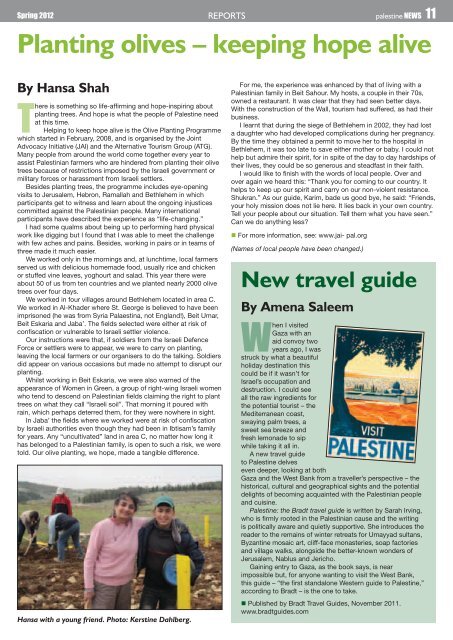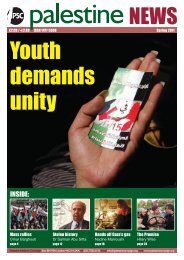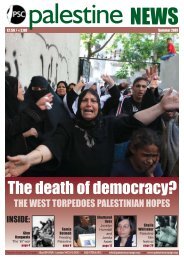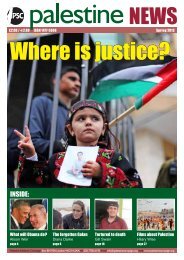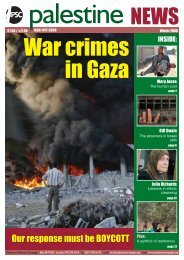10 palestine NEWS REPORTSSpring 2012and doctors. Tha’er, who began his strike on 29 February, waskidnapped by the Israeli army in June 2010 at his home in the WestBank and has been held under repeatedly renewed AdministrativeDetention ever since.On 7 May, the 70th day of their hunger strike, the Israeli HighCourt rejected petitions regarding the Administrative Detentionorders of both men. In complete disregard of their critical medicalcondition, the Court stated that “hunger strikes are not relevant todecide on length of Administrative Detention as such.”The Court recommended in Tha’er’s case that, since he hasalready spent nearly two years in Administrative Detention, the IsraeliSecurity Service should investigate more in depth before extendinghis detention order to see if there are any possible alternatives. TheCourt further stated that if his detention order is extended, a morethorough interrogation should occur. The Court reiterated that theserecommendations were irrespective of his hunger strike.In Bilal’s case, the Court also suggested that if his AdministrativeDetention order is renewed, and his health permits extendeddetention, he should also be re-interrogated. The Courtrecommended that the Security Service shorten his order from sixmonths to three or four.Palestinian prisoners include 6 women, about 200 childrenand 27 members of the Palestinian Legislative Council. The waysin which Israel violates international law regarding the mannerof arrest, interrogation and detention of Palestinians, includingevidence of torture and degrading treatment, have been welldocumented by human rights organisations. See www.addameer.org, www.alhaq.org, www.btselem.org, www.hamoked.org andwww.phr.org.il.• Follow developments on #PalHunger.Sheikh Raed exonerated,Home Secretary discreditedSheikh Raed Salah, who cameto Britain in June 2011 on a10-day lecture tour, finallyreturned home on 16 April,after a gruelling struggle to resistdeportation and clear his name.The Sheikh is an Israeli citizenwho campaigns for Palestinianrights within Israel, opposing thediscrimination, house demolitionsand attempts at ethnic cleansingpractised by the Israeli authorities.He spoke in a public meeting inLondon before being arrested and detained on the orders of theHome Secretary, Theresa May, on the grounds that his presence inBritain was “not conducive to the public good.” There followed awell-orchestrated smear campaign in the media, in which the Sheikhwas represented as a dangerous anti-semite preaching hatred andviolence.It later transpired that the Home Secretary had been misinformedby the Community Security Trust, a registered charity whichmonitors anti-semitic attacks in Britain, who had sent her a reportaccusing the Sheikh of grossly anti-semitic statements. It seems shefailed to check on the claims of the CST, but acted immediately toexclude him.After months of wrangles through the courts and after hundredsof thousands of pounds of taxpayers’ money had been spent,all charges against Sheikh Raed were thrown out by the UpperImmigration Tribunal on 5 April. In his ruling, Mr Justice Ockelton,the President of the Tribunal, said Ms May had been “misled” on thecase, noting that the CST had been the only source of informationused by the Home Office.Jeremy Corbyn MP, who hosted a meeting in Parliament thatSheikh Raed was supposed to attend, supported the Sheikhthroughout the legal proceedings. He called for a public inquiry intothe way the whole affair was handled: “Previous Home Secretarieshave been forced out of office for less than this. I think we need anopen, independent inquiry into the whole process.” At the sametime he renewed his invitation to the Sheikh to return to the UK tospeak in Parliament and to tell the British people about the plight ofPalestinian citizens of Israel.Jeremy has since been pursued and smeared by the CST, whohave accused him of anti-semitism and likened him to Nick Griffin ofthe BNP, for raising the question of how Theresa May came to banSheikh Raed.Before leaving the UK Sheikh Raed said: “Despite the Israelipolicy of ‘transfer’ – another term for ethnic cleansing – thePalestinians will not go away. The Israeli state can occupy our lands,demolish our homes, drill tunnels under the old city of Jerusalem –but we will not disappear.”Environmental crime – 2000olive trees to be uprootedPalestinian, Israeli and international peace activists arekeeping a vigil to try to prevent the Israeli army fromuprooting 2000 olive trees in the Wadi Qana area nearthe West Bank village of Deir Istiya.Notices ordering nine farmers in this major oliveproducing area to destroy 1400 of their trees were placedon retaining terraces, rocks and fences in April. They statedthat, if the orders were not carried out by 1 May, the farmerswould face punishment which could, according to Deir Istiyamayor, Nazmi Salman, include large fines and imprisonment.That shocking number was already 400 more trees thanthe total number uprooted in all of 2011. A few days later,another farmer found the same order for 600 trees to beuprooted, bringing the total number to 2000. By the time ofgoing to press, the orders had not been carried out but theIsraeli Occupation Forces could enforce it at any time.Taysir Arbasi, from Zaytoun in <strong>Palestine</strong>, said the treeswere between three and 15 years old and planted onprivately-owned Palestinian property. They produce around5,000 kg of olives a year.The Israeli government has unilaterally declaredthis Palestinian land as a “protected natural area” — adesignation it gives to land in order to expel Palestiniansfrom it. The real reason for turning productive land into a“nature reserve” is likely to be the proximity of eight largesettlements which have been built on, or adjacent to, 15,000dunums of Palestinian land.Wastewater from the outposts around these settlementsis illegally dumped into a natural spring used by the olivefarmers. Last autumn over 100 trees in Deir Istiya weredestroyed by flooded wastewater.Additionally, fanatical settlers harass the villagers andcommit acts of violence, including arson. Earlier this yearsettlers desecrated a mosque during a wave of “price tag”revenge actions sparked by the demolition of an Israeli outpost.
Spring 2012 REPORTSpalestine NEWS 11Planting olives – keeping hope aliveBy Hansa ShahThere is something so life-affirming and hope-inspiring aboutplanting trees. And hope is what the people of <strong>Palestine</strong> needat this time.Helping to keep hope alive is the Olive Planting Programmewhich started in February, 2008, and is organised by the JointAdvocacy Initiative (JAI) and the Alternative Tourism Group (ATG).Many people from around the world come together every year toassist Palestinian farmers who are hindered from planting their olivetrees because of restrictions imposed by the Israeli government ormilitary forces or harassment from Israeli settlers.Besides planting trees, the programme includes eye-openingvisits to Jerusalem, Hebron, Ramallah and Bethlehem in whichparticipants get to witness and learn about the ongoing injusticescommitted against the Palestinian people. Many internationalparticipants have described the experience as “life-changing.”I had some qualms about being up to performing hard physicalwork like digging but I found that I was able to meet the challengewith few aches and pains. Besides, working in pairs or in teams ofthree made it much easier.We worked only in the mornings and, at lunchtime, local farmersserved us with delicious homemade food, usually rice and chickenor stuffed vine leaves, yoghourt and salad. This year there wereabout 50 of us from ten countries and we planted nearly 2000 olivetrees over four days.We worked in four villages around Bethlehem located in area C.We worked in Al-Khader where St. George is believed to have beenimprisoned (he was from Syria Palaestina, not England!), Beit Umar,Beit Eskaria and Jaba’. The fields selected were either at risk ofconfiscation or vulnerable to Israeli settler violence.Our instructions were that, if soldiers from the Israeli DefenceForce or settlers were to appear, we were to carry on planting,leaving the local farmers or our organisers to do the talking. Soldiersdid appear on various occasions but made no attempt to disrupt ourplanting.Whilst working in Beit Eskaria, we were also warned of theappearance of Women in Green, a group of right-wing Israeli womenwho tend to descend on Palestinian fields claiming the right to planttrees on what they call “Israeli soil”. That morning it poured withrain, which perhaps deterred them, for they were nowhere in sight.In Jaba’ the fields where we worked were at risk of confiscationby Israeli authorities even though they had been in Ibtisam’s familyfor years. Any “uncultivated” land in area C, no matter how long ithas belonged to a Palestinian family, is open to such a risk, we weretold. Our olive planting, we hope, made a tangible difference.Hansa with a young friend. Photo: Kerstine Dahlberg.For me, the experience was enhanced by that of living with aPalestinian family in Beit Sahour. My hosts, a couple in their 70s,owned a restaurant. It was clear that they had seen better days.With the construction of the Wall, tourism had suffered, as had theirbusiness.I learnt that during the siege of Bethlehem in 2002, they had losta daughter who had developed complications during her pregnancy.By the time they obtained a permit to move her to the hospital inBethlehem, it was too late to save either mother or baby. I could nothelp but admire their spirit, for in spite of the day to day hardships oftheir lives, they could be so generous and steadfast in their faith.I would like to finish with the words of local people. Over andover again we heard this: “Thank you for coming to our country. Ithelps to keep up our spirit and carry on our non-violent resistance.Shukran.” As our guide, Karim, bade us good bye, he said: “Friends,your holy mission does not lie here. It lies back in your own country.Tell your people about our situation. Tell them what you have seen.”Can we do anything less?• For more information, see: www.jai- pal.org(Names of local people have been changed.)New travel guideBy Amena SaleemWhen I visitedGaza with anaid convoy twoyears ago, I wasstruck by what a beautifulholiday destination thiscould be if it wasn’t forIsrael’s occupation anddestruction. I could seeall the raw ingredients forthe potential tourist – theMediterranean coast,swaying palm trees, asweet sea breeze andfresh lemonade to sipwhile taking it all in.A new travel guideto <strong>Palestine</strong> delveseven deeper, looking at bothGaza and the West Bank from a traveller’s perspective – thehistorical, cultural and geographical sights and the potentialdelights of becoming acquainted with the Palestinian peopleand cuisine.<strong>Palestine</strong>: the Bradt travel guide is written by Sarah Irving,who is firmly rooted in the Palestinian cause and the writingis politically aware and quietly supportive. She introduces thereader to the remains of winter retreats for Umayyad sultans,Byzantine mosaic art, cliff-face monasteries, soap factoriesand village walks, alongside the better-known wonders ofJerusalem, Nablus and Jericho.Gaining entry to Gaza, as the book says, is nearimpossible but, for anyone wanting to visit the West Bank,this guide – “the first standalone Western guide to <strong>Palestine</strong>,”according to Bradt – is the one to take.• Published by Bradt Travel Guides, November 2011.www.bradtguides.com


